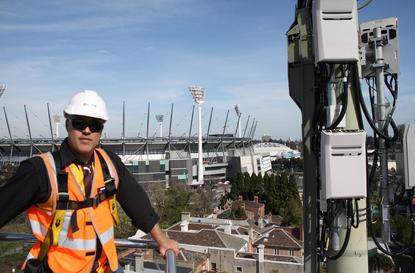Union to meet with Telstra as telecom job cuts pile up
- 23 May, 2013 11:33

Credit: Telstra
The Communications Workers Union, the communications branch of the Communications, Electrical and Plumbing Union (CEPU), plans to meet with Telstra on Tuesday to learn more about the telco’s restructuring plans and what they mean for industry jobs, according to CWU national assistant secretary Ken Hardisty.
Telstra chief operating officer, Brendon Riley, announced yesterday that the telco will be restructured, splitting operations into five groups to deliver the company’s services, effective 1 July.
However, job cuts resulting from the restructure have not been “verified,” Hardistry told Computerworld Australia.
“We’re due to meet with them on Tuesday next week to hopefully get more information and dig a bit deeper on where they’re at and what their plans are.”
Possible job cuts at Telstra and other telcos may indicate a changing telco industry and a slowing economy, according to IBRS analyst Guy Cranswick.
“With the Telstra cuts, this is a bottom-up restructure which appears to take account of the next phase of the telco business and how it must be served,” said Cranswick.
“Hence the radical impending cuts and realignment. It's been flagged as a once-in-a-decade move and that might be almost right if memory is accurate.”
In an internal memo to Telstra employees, Riley wrote that Telstra’s traditional businesses “are coming under increasing margin pressure and the largest portion of our budget is spent supporting them. This is not a sustainable business model and we have an obligation to redefine our contributions to Telstra.”
Optus recently completed a restructure of its enterprise and government division, integrating Optus Business with Alphawest and SingTel subsidiary NCS. The restructure contributed to nearly 1000 layoffs in 2012 and another round of job cuts this year.
Meanwhile, Vodafone Hutchison Australia last year announced 500 job cuts—about 10 per cent of its workforce—as part of its own restructure. At the time, CEO Bill Morrow said the move would “enable a more leaner, more effective operating model.”
In March, Vodafone was able to add 750 jobs in Tasmania after receiving a cash infusion from the federal and Tasmanian governments.
“Other cuts in the telcos are probably correlated in some degree but also largely influenced by operating margin and competition that Optus and Vodafone have had to deal with,” said Cranswick.
“I think we will see more of this in the second half of the year as the economy slows further.”
“It’s a tough market,” said IDC analyst Dustin Kehoe. “If you’re just talking about mobile voice and data, the market is going flat or slightly downwards ... It’s been that way for years.”
“You can have some short-term gains when you acquire customers” from rival telcos, he said. “But still, you can gain market share, you can gain revenue by acquisition, but even that comes to an end some day.”
“Some of it is of course market-driven,” CWU’s Hardisty said of job cuts in the telecom industry. However, he noted that last year’s cuts at Optus appeared more related to an internal focus of joining together duplicative parts of the business, he said.
The CWU is concerned about what the upcoming federal election may mean for telecom jobs building out the NBN, Hardistry said. The group prefers the current fibre-to-the-home approach taken by the Labour party, he said.
Follow Adam Bender on Twitter: @WatchAdam
Follow Computerworld Australia on Twitter: @ComputerworldAU, or take part in the Computerworld conversation on LinkedIn: Computerworld Australia

